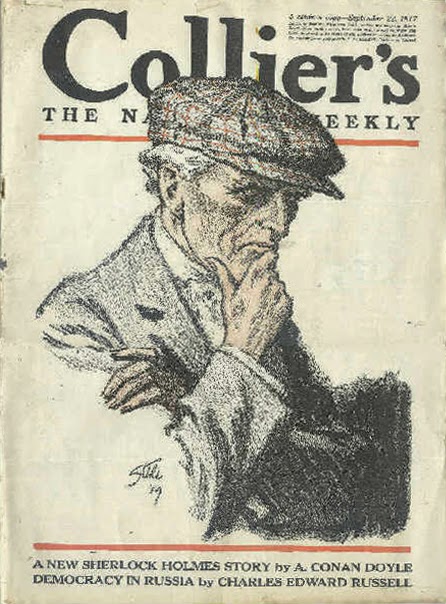This I find totally appropriate and as fine an artistic choice as, for example, the multifaceted, bustling, Dickensian complexity of "The Blue Carbuncle".
"His Last Bow" chronicles a fiction set in what Doyle's readers knew all too well by September 1917 had, in real life, proved "the most terrible August in the history of the world". As they read it, they knew not when the struggle would end or who would win. After three years, war and only war was the single all-consuming reality.
Doyle reflects and respects this by muting the comfortable and familiar until the final intimate, lyrical exchange where fictional words spoken in 1914 are charged with the actual sober defiance of '17.
That real future is effectively intertwined with four years of fiction within the story's August 1914 hour of action and these resonances render the defeat of Von Bork symbolically momentous.
 |
| Von Bork, captive. Illus A Gilbert, The Strand 1917. |
So, as we follow the sequence of fictional episodes, present and past, it is within the known context of real and apocalyptic events. And the author's motive is as simple as his story - reassurance, in pursuit of which every element is designed to illustrate the complacency of the enemy and the superior ingenuity of John Bull.
That pattern is there in the construction of what occurs within an hour from 9 pm on August 2nd 1914.
The first half hour belongs to Von Bork and Von Herling. Doyle gives them their (premature) self-congratulatory taste of victory. "The good Altamont" is understood (before his arrival) to be admired and trusted implicitly. The reader is at this stage no wiser than the Germans and (with a Sherlockian delight in the dramatic), the author delays Holmes's coup de theatre to allow the detective private amusement in Altamont's baiting of Von Bork about his exposed agents.
To the victors however goes the second half hour, crowned with a nostalgic tableau of the way things were.
 |
| Bruce & Rathbone "Sherlock Holmes and the Voice of Terror" (Universal) 1942. |
From the conversations in both phases of the story's present the reader is guided to a similar understanding of the past.
Initially, we believe, with Von Bork, that he has inveigled himself into English society since 1910 without suspicion and amassed a treasure trove of secrets that will soon be in Berlin. The work of four years is all but finished; he awaits only the latest set of naval signal codes to be delivered that night by his most resourceful spy. He has already sent his wife and large household to Flushing in Holland, leaving only himself and one servant, old Martha, who "might almost (harmlessly) personify Britannia".
Doyle proceeds comprehensively to undercut every apparent enemy achievement. If the betrayal and capture of Steiner surprises Von Bork, it pales to insignificance once all is revealed. The ironies cut as deep into the German as they will delight his enemies.
Sailing under the false colours of "a good old sport" is exposed both as a paper-thin disguise and no true reflection of the blackguard within as Doyle presents the newly revealed Holmes with all the courtesies of a real sportsman and gentleman.
Did he but know it, Von Bork was a dead duck in the water from the moment Altamont surfaced in 1912. Undetected as submarines, Holmes and his female confederate disguised as old Martha penetrate organization and household. Networks of communication and agents are fatally, secretly compromised. No wonder then at the German master spy's incandescent curse.
 |
| Von Bork humiliated. Illus A Gilbert, The Strand 1917. |
As Sherlock Holmes notes, following this "furious stream of German invective", the German's unmusical outburst is an "old sweet song" often heard in days gone by. It's a swansong: Von Bork has taken His Last Bow.
Epilogue.
And so had "Altamont". So too, did Conan Doyle intend the collection's eponymous title to signal the last of the stories.
In this centenary year we are perhaps best placed to be thankful the only last bow in real life was that of the Kaiser. Cameth the hour, cameth the men.
This one.
This one.
And Millions Like Us.
© Ray Wilcockson (2014) All rights Reserved
Further Reading:
"His Last Bow" by Sir Arthur Conan Doyle may be read on line HERE .
My short story "Good Night, Mr. Sherlock Holmes" imagines the events of the day after "His Last Bow" and may be read HERE .





No comments:
Post a Comment